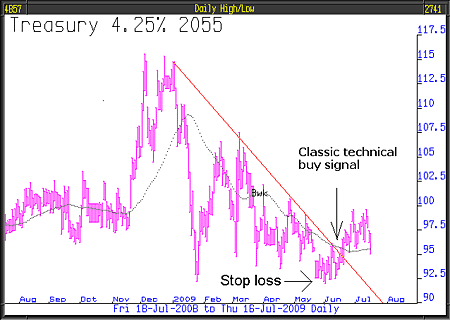Get the latest financial news, insights and expert analysis from our award-winning MoneyWeek team, to help you understand what really matters when it comes to your finances.
You are now subscribed
Your newsletter sign-up was successful
Want to add more newsletters?

Twice daily
MoneyWeek
Get the latest financial news, insights and expert analysis from our award-winning MoneyWeek team, to help you understand what really matters when it comes to your finances.

Four times a week
Look After My Bills
Sign up to our free money-saving newsletter, filled with the latest news and expert advice to help you find the best tips and deals for managing your bills. Start saving today!
If we are right in believing that inflation is not the risk but deflation is, then short- and long-term interest rates are destined to remain low. Such a belief justifies our faith in long-dated UK gilts, though it must be said we hold these with a relatively tight stop loss. When everybody finally agrees that asset prices are in an irreversible decline, then investors will hunt out safe long-term fixed income investments and gilts will soar.
As deflation bites, the present unwillingness of banks to lend to other than undoubted households and businesses, will be magnified, the authorities will print money with impunity and the banks will mimic what Japan has done in similar circumstances; hoard money on their balance sheets, probably invested in government bonds.

Today, everybody says inflation is the problem because governments are printing so much money. But the economic conditions of unemployment, lack of wage growth, asset price weakness and above all else, dramatic over-capacity, means that inflation just can't gain traction.
MoneyWeek
Subscribe to MoneyWeek today and get your first six magazine issues absolutely FREE

Sign up to Money Morning
Don't miss the latest investment and personal finances news, market analysis, plus money-saving tips with our free twice-daily newsletter
Don't miss the latest investment and personal finances news, market analysis, plus money-saving tips with our free twice-daily newsletter
We quote from Martin Wolf's recent article "The latest consensus forecast for growth in the high-income countries of 2010 will be below potential yet this is also at a time when the admittedly uncertain estimate of output gaps (or excess capacity) are at extreme levels. For 2009 the OECD estimates these at 4.9% of potential GDP in the US, 5.4% in the UK, 5.5% in the Eurozone and 6.1% in Japan. risks of deflation are self-evident June's hysteria over rising yields on conventional bonds looks absurd."
The fear of inflation is probably deflation's strongest ally. Governments and their advisers are more concerned about printing too much money than too little so they won't print enough.
As the economy continues to struggle, central banks will be forced to maintain virtual zero interest rate policies and will only change that policy if inflation raises its head. As we reported a couple of issues ago, Japan has been running interest rates below 1% for about 15 years and still no end is in sight!
This article was written by Full Circle Asset Management, as published in the threesixty Newsletter on 17 July 2009
Get the latest financial news, insights and expert analysis from our award-winning MoneyWeek team, to help you understand what really matters when it comes to your finances.
MoneyWeek is written by a team of experienced and award-winning journalists, plus expert columnists. As well as daily digital news and features, MoneyWeek also publishes a weekly magazine, covering investing and personal finance. From share tips, pensions, gold to practical investment tips - we provide a round-up to help you make money and keep it.
-
 Japanese stocks rise on Takaichi’s snap election landslide
Japanese stocks rise on Takaichi’s snap election landslideJapan’s new prime minister Sanae Takaichi has won a landslide victory in a snap election, prompting optimism that her pro-growth agenda will benefit Japanese stocks
-
 Alphabet 'is planning a 100-year bond': would you back Google for 100 years?
Alphabet 'is planning a 100-year bond': would you back Google for 100 years?Google owner Alphabet is reported to be joining the rare century bond club

